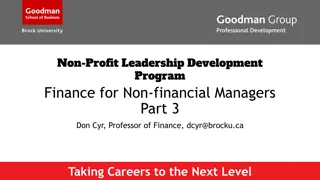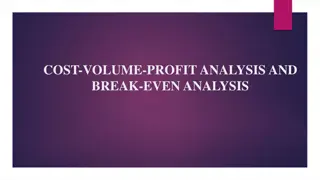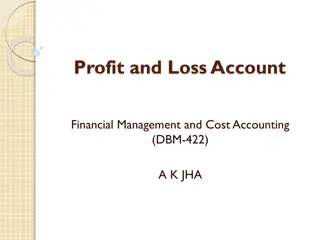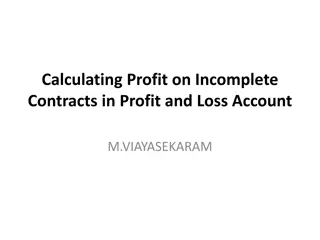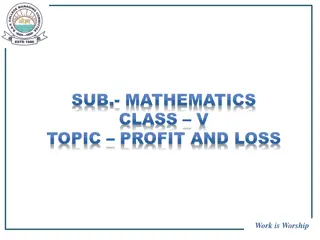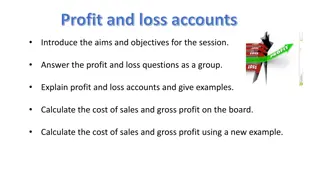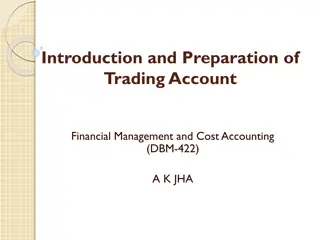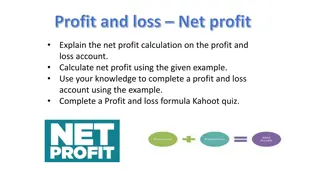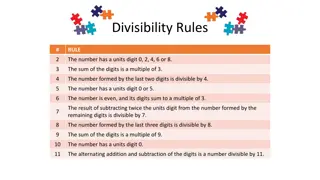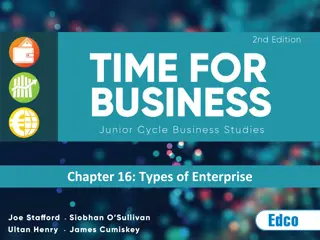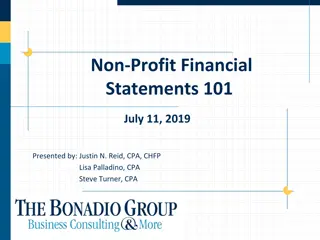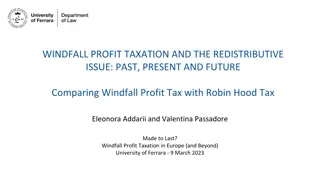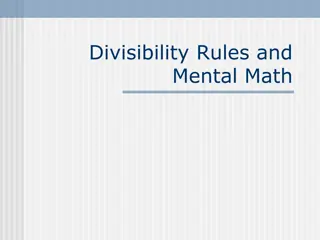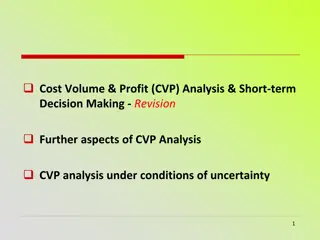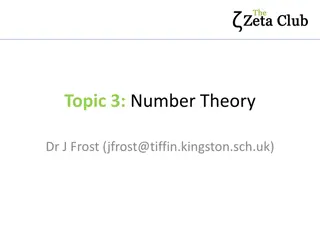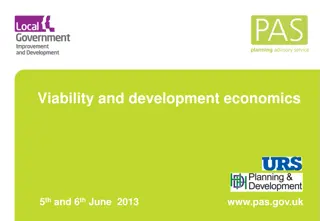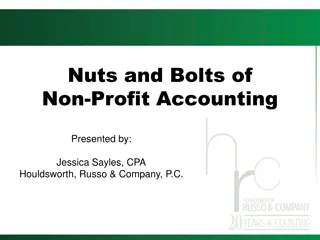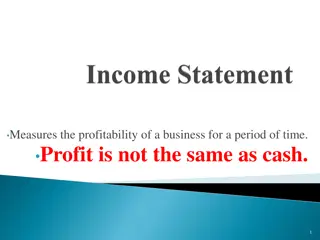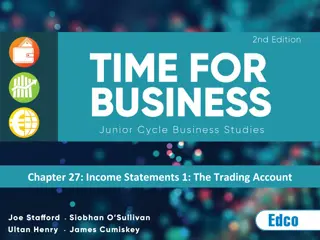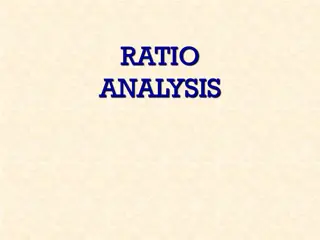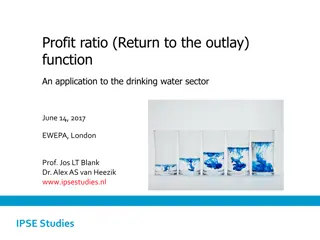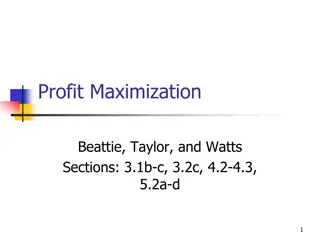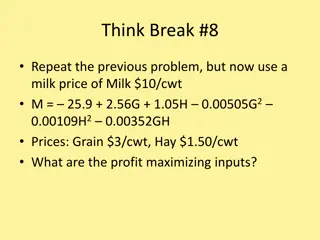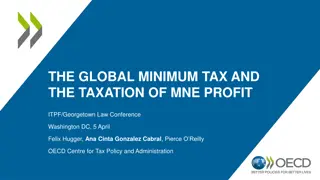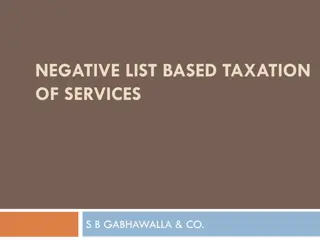Partnership Final Account
Partnership final account in the case of admission of a partner in a firm involves dividing the accounting year into two periods, determining expenses and incomes, and sharing profits accordingly. Different methods like Fixed capital method and Fluctuation capital method are used for this purpose. T
1 views • 12 slides
NOT-FOR- PROFIT MAKING CONCERN
Not-for-profit organizations, such as educational institutions, public hospitals, and charitable trusts, operate with the main objective of providing services rather than making profits. These organizations rely on various sources of funding like contributions, donations, and grants. Accounting for
4 views • 4 slides
Understanding the Scope of Managerial Economics
Managerial economics plays a crucial role in decision-making processes within businesses, focusing on optimizing limited resources for profit maximization. It encompasses both microeconomics and macroeconomics, utilizing economic theories to analyze the business environment. Key aspects such as dema
2 views • 6 slides
Understanding Redemption of Preference Shares
Redemption of preference shares involves the repayment of fixed-rate dividend-bearing shares within stipulated terms and conditions, crucial for companies to comply with company laws. Divisible and Non-Divisible Profits play key roles in facilitating the redemption process. Different types of prefer
0 views • 7 slides
Franklin County Urban Agriculture Critical Infrastructure Grant 2023-2024
This grant initiative in Franklin County aims to strengthen the local food supply chain, support urban farms, and provide critical infrastructure funding to eligible organizations. With a focus on increasing food crop production and distribution while ensuring support for socially disadvantaged farm
0 views • 12 slides
Non-Profit Leadership Development: Finance Essentials for Managers
Explore the key concepts of finance for non-financial managers in the non-profit sector. Learn about cost benefit analysis, measures of project worthiness, and essential financial tools such as NPV, IRR, and ROI. Understand how to assess project risks and make informed financial decisions to enhance
1 views • 47 slides
Understanding Cost-Volume-Profit Analysis and Break-Even Analysis
Cost-Volume-Profit (CVP) analysis is a valuable technique that examines the connection between costs, volume, and profits in business operations. By determining the break-even point, setting selling prices, optimizing product mix, and enhancing profit planning, CVP analysis aids in making informed d
0 views • 29 slides
Understanding Profit and Loss Account in Financial Management
Profit and Loss Account is a crucial financial statement prepared to determine the net profit or loss of a business during a specific accounting period. It involves transferring gross profit or loss from the trading account, recording indirect expenses, including administrative and selling costs, an
0 views • 9 slides
Understanding Profit Calculation on Incomplete Contracts
Learn how to calculate profit on incomplete contracts in profit and loss accounts. Discover the rules determining when to credit profits on unfinished contracts, including provisions for potential losses. Follow a practical example to understand the application of these rules.
1 views • 5 slides
Understanding Profit: The Entrepreneur's Reward
Profit is the reward for entrepreneurial functions and differs from returns on other factors due to its uncertain and residual nature. Various theories such as Frictional, Monopoly, Compensatory, and Innovation shed light on the complexities of profit generation in business.
0 views • 15 slides
Understanding Profit and Loss in Mathematics Class V
Explore the topic of profit and loss in Mathematics Class V through learning objectives, worksheets, videos, and explanations of cost price, selling price, profit, and loss. Practice solving real-world problems related to profit and loss to enhance your understanding. Embrace the concept that "Work
0 views • 29 slides
Understanding Profit and Loss in Business Transactions
Learn about cost price, selling price, profit, loss, profit percentage, loss percentage, marked price, discount, successive discount, goods and services tax. Explore the historical context of profit and loss statements from the barter system to modern business transactions. Practice calculating prof
0 views • 31 slides
Understanding Profit and Loss Accounts in Business
Profit and loss accounts provide a detailed overview of a business's trading income and expenditure over the previous 12 months. They involve calculating key figures like cost of sales and gross profit to assess the financial performance. This session aims to explain the concepts, answer common ques
0 views • 14 slides
Introduction and Preparation of Trading Account in Financial Management
Financial statements play a crucial role in understanding a firm's financial position and profitability. They include a Balance Sheet, Profit and Loss Account, and schedules. Trading Account is the initial step in final accounts preparation, focusing on gross profit or loss. It helps determine the p
0 views • 13 slides
Understanding Net Profit Calculation in Profit and Loss Accounts
Net profit, also known as the bottom line, is a crucial indicator of a business's financial performance. It is calculated by deducting total expenses from gross profit. In the provided example for Frying Tonite, the net profit is $30,110 after subtracting expenses of $38,590 from a gross profit of $
0 views • 11 slides
Understanding Divisibility Rules for Quick Math Solutions
Learn about various rules of divisibility such as checking if a number is divisible by 2, 3, 4, 5, 7, 8, 9, 11, and finding factors. Explore examples like forming multiples of 4 with digits 2, 4, 6, and 8, determining the number of zeros in factorials, and finding the greatest number dividing six co
1 views • 4 slides
Understanding Musharakah in Islamic Finance
Musharakah is a partnership established through mutual consent for profit and loss sharing in joint ventures. Partners must be capable and enter into contracts freely. There are guidelines on profit distribution, non-working partners, capital contributions, and asset ownership in Musharakah. Avoid f
0 views • 17 slides
Understanding Enterprise: Types and Impact on Society
Explore the various types of enterprises such as financial, cultural, and social, and understand their key features and roles in society. Learn about local, national, and global organizations, financial enterprises' profit-making activities, and the societal contributions of both for-profit and not-
1 views • 18 slides
Understanding Non-Profit Financial Statements: Key Insights
Delve into the fundamental disparities between non-profit and for-profit financial statements, exploring key indicators, such as balance sheets, assets, liabilities, and net assets. Discover the distinct financial structures and reporting methods that differentiate non-profit organizations from thei
0 views • 16 slides
Windfall Profit Taxation: Past, Present, and Future
The presentation discusses windfall profit taxation measures in Europe, specifically in Italy, comparing the old Robin Hood tax with new contributions. It explores the aims, issues, tax rates, and bases of windfall profit taxation, highlighting its redistributive purposes and challenges in constitut
1 views • 14 slides
Importance of Accounting in Business Operations
An accounting system plays a crucial role in providing information about a business's profitability. For sole traders, preparing a Trading and Profit and Loss Account along with a Balance Sheet helps depict the financial status. The process of finalizing accounts involves steps like Trading Account,
0 views • 8 slides
Divisibility Rules and Mental Math
Understand and apply different divisibility rules for numbers, including rules for divisibility by 2, 3, 4, 5, 6, 9, and 10. Learn how to determine if a number is divisible by performing mental math calculations based on these rules.
0 views • 6 slides
Understanding Cost-Volume-Profit (CVP) Analysis for Short-term Decision Making
Cost-Volume-Profit (CVP) analysis is a crucial technique for businesses to assess the impact of changes in sales volume on costs, revenue, and profit. It helps in determining break-even points, planning future operations, and guiding strategic decisions under uncertain conditions. Understanding cost
0 views • 34 slides
Understanding Number Theory Concepts with Dr. J. Frost
Explore number theory concepts with Dr. J. Frost, including divisibility tricks, coprime numbers, and breaking down divisibility problems. Learn about key principles in number theory such as identifying if a number is divisible by certain factors and understanding coprime numbers and their relations
0 views • 26 slides
Understanding Costs, Revenue, and Profit in Economics
Cost is the expenditure on goods or services, including opportunity cost. It can be explicit or implicit. Measuring opportunity cost involves factors of production and sacrifices. Economic profit considers opportunity cost while accounting profit does not. Production in the short run depends on inpu
0 views • 53 slides
Issues and Trends in For-Profit Child Care: A Comprehensive Overview
The prevalence of for-profit child care centers in Canada is on the rise, with about 29% of center spaces dedicated to for-profit services in 2021. Ontario's childcare landscape shows a significant presence of both non-profit and for-profit multi-site groups. International examples from countries li
0 views • 13 slides
Understanding Viability and Development Economics in the Real Estate Sector
Explore crucial aspects of viability and development economics in real estate, including profit-making strategies, site identification, risk management, land valuation, and sustainable practices discussed in a seminar featuring guest speaker Ian Storey from Storey Homes. The event delves into the im
0 views • 14 slides
Understanding Non-Profit Accounting Essentials
Learn the basics of non-profit accounting, including what defines a non-profit organization, common types of non-profits, governance structures, and legal responsibilities. Discover key insights on IRS and state requirements for non-profits in this informative presentation by Jessica Sayles, CPA fro
0 views • 55 slides
Understanding Business Profitability and Income Statements
The concept of business profitability, illustrated through Mr. Seow's iPhone selling business, is explained in detail. The calculation of profit considering costs like rent and salaries is demonstrated. Gross profit, net profit, and their significance in measuring business success are discussed alon
0 views • 8 slides
Understanding Income Statements in Financial Accounting
An income statement, comprising of a Trading Account and Profit and Loss Account, is vital for assessing a company's financial performance. It helps determine profits, losses, and overall worth. The Trading Account specifically calculates the gross profit or loss from core activities, while the Prof
0 views • 18 slides
Understanding Ratio Analysis for Business Performance Evaluation
Ratios in ratio analysis are crucial for analyzing and comparing business performance over time and against other businesses. They are categorized into profitability, liquidity, and efficiency ratios. Profitability ratios like gross profit percentage, net profit percentage, and return on capital emp
0 views • 31 slides
CADCAI Audited Financial Report 2016 Summary & Analysis
The CADCAI Audited Financial Report for 2016 reveals key insights into the organization's financial performance. CADCAI is a not-for-profit organization with income tax exemption and registered GST. The report showcases a current year profit of $14,067 and total retained profit since 1986 of $412,30
0 views • 19 slides
Application of Profit Ratio Function in the Drinking Water Sector
The application of the profit ratio function in the drinking water sector is discussed, focusing on optimizing value functions and measuring productivity change in the Netherlands. The function analyzes input demand, output supply, and profit ratios, offering insights into efficiency and profitabili
0 views • 20 slides
Understanding Open Access and Collaboration in the Not-for-Profit Sector
This text discusses the experiences of open access within the not-for-profit sector, focusing on the work of Care Alliance Ireland in supporting family carers. It highlights the challenges and benefits of collaboration between not-for-profit organizations, academia, and researchers, emphasizing the
0 views • 11 slides
Understanding Profit Maximization and Revenue Concepts in Economics
Explore the concepts of profit maximization, revenue generation, and marginal analysis in economics. Learn how to define profit, calculate total revenue and cost, and understand marginal revenue. Discover the significance of marginal value of product and its impact on business decision-making.
0 views • 60 slides
Profit Maximization Analysis with Milk Price Variation
Using a milk price of $10/cwt, grain price of $3/cwt, and hay price of $1.50/cwt, the profit-maximizing inputs for milk production are determined through mathematical calculations. The optimal weekly inputs are found to be 182.5 lbs of grain and 118.2 lbs of hay, resulting in a weekly profit of $23.
0 views • 4 slides
The Global Minimum Tax and MNE Profit Taxation
The OECD has conducted an extensive economic impact assessment of the Global Minimum Tax (GMT) for multinational enterprises (MNEs), focusing on tax rate differentials, profit shifting, low-taxed profits, and revenue gains. The research includes building a matrix of profit locations, assessing ETR h
0 views • 16 slides
Understanding the Costs of Production and Profit Maximization
Explore the concept of costs of production in business, distinguishing between explicit and implicit costs. Learn the difference between economic profit and accounting profit, and understand the importance of considering all costs in maximizing profit. Dive into examples and the production function
0 views • 36 slides
Negative List Based Taxation of Services by S.B. Gabhawalla & Co.
This content delves into the conceptual framework of negative list based taxation of services, including the definition of service, elements such as service territory and value, and the framework dissecting the charge at 12%. It also explains what services are excluded from taxation and provides exa
0 views • 36 slides
Fair Cake-Cutting Methods for Envy-Free Allocations
Various fair cake-cutting methods for allocating divisible goods among multiple agents are explored in this content. These methods ensure that each agent receives a share proportionate to their preferences, without feeling envious of others' allocations. Techniques such as connected pieces, bounded-
0 views • 28 slides





